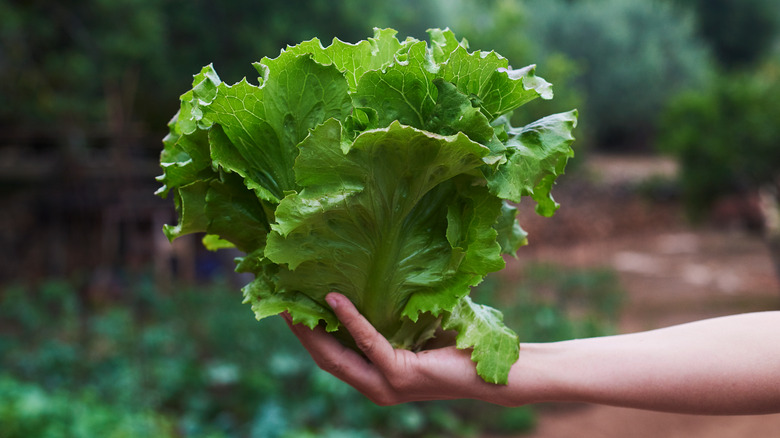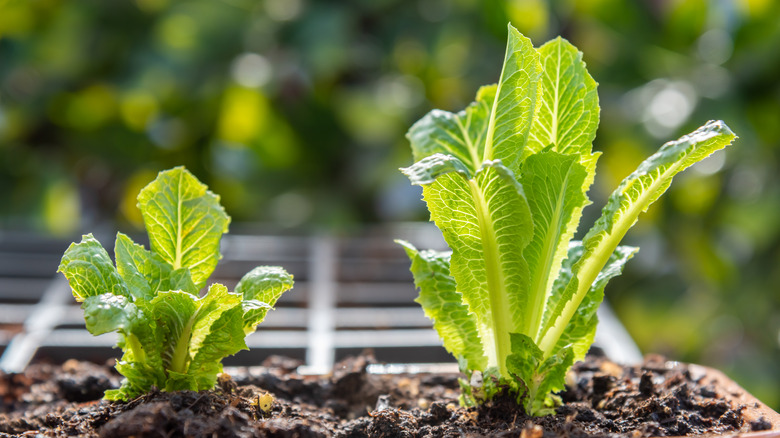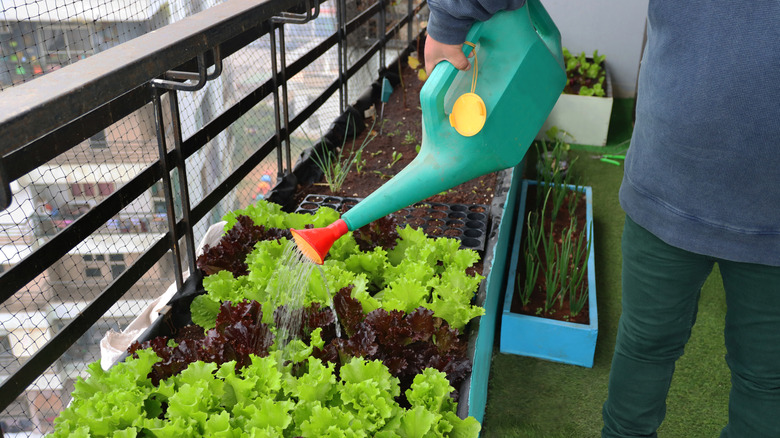Why Your Home-Grown Lettuce Tastes So Bitter (And What To Do About It)
Home gardeners often cultivate lettuce since it's relatively easy to grow, is low-carb, and adds character to homemade burgers, sandwiches, and salads. But if not cared for adequately, your home-grown lettuce can begin developing bitter leaves in no time. Though bitter lettuce leaves are not toxic to humans and are safe for consumption, they're inedible and can effectively ruin your meals. Luckily, the most common reason for bitter leaves (too much heat) is a rather simple problem to solve.
Lettuce is an annual green leafy vegetable, but being a cool-weather crop, it especially thrives when the temperature ranges between 60 to 75 degrees Fahrenheit. So while your plant might be producing superior-quality leaves during spring, you may notice them turn bitter in the summer. Although shading your plant and watering it adequately can help prevent this from happening, it's essential to keep an eye on your plant to determine the reason behind bitter leaves so you can take the necessary corrective measures.
Reasons your home-grown lettuce leaves taste bitter
During summers, the rising temperatures– above 80 degrees Fahrenheit — make the lettuce plant grow and mature faster, causing it to bolt. When that happens, your plant will begin producing flowers and buds earlier than expected, and along with them, bitter-tasting compounds that affect the flavor of the leaves. Another reason for bitter leaves is a lack of water. If your plant is thirsty, its leaf edges will turn brown and become unpalatable.
In case the soil is not dry and the temperatures are yet to soar, your leaves may taste off due to a lack of nitrogen, potassium, and phosphorus. Lettuce is a fast-growing plant that needs nutrient-rich fertilizers to support its growth. Too little of it can stunt the growth of the plant and lead to a bitter flavor.
Finally, your plant may have aster yellow phytoplasma or aster yellows disease. Some common symptoms are misshapen leaves, stunted growth, and yellow coloring. If you suspect your lettuce has aster yellows, the best thing to do is to separate the plant to stop the disease from spreading.
Prevent your lettuce leaves from tasting bitter
To prevent lettuce from bolting and your leaves from turning bitter, the first step is to place your plant in a shaded area or cover it with a shade cloth. Though lettuce needs five hours of sunlight every day to grow into a healthy and happy plant, being subject to direct sunlight beyond that can cause it to bolt. Give your plant about 1 to 2 inches of water per week — in the morning or evening — to ensure the soil is moist. You may have to water the plant more frequently if you notice the soil drying between sessions, but take care not to waterlog the soil. While you're at it, check if the soil is draining adequately — you can add some mulch to the soil to help it retain moisture and fertilize it.
Harvesting time also plays a crucial role in the taste of your lettuce. Pluck the leaves early in the morning to prevent them from getting heat-stressed. Place the harvested leaves in cold water and let them soak for a few minutes before drying them and placing them in the refrigerator. Baby leaves are often sweeter than more mature ones, so keep this in mind when choosing to right harvesting time for your taste.


